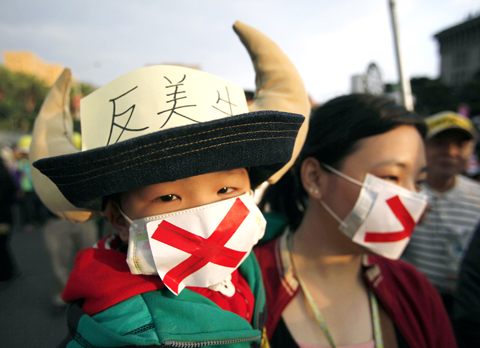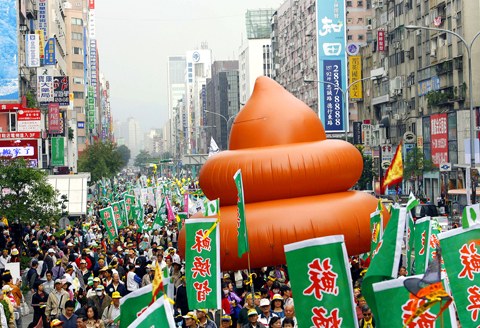Wearing headbands with the words “no to poisonous beef” and “no to deception,” thousands of people took to the streets of Taipei yesterday afternoon to voice their opposition to the government’s decision to lift a ban on US bone-in beef and beef organs, and urge the government to renegotiate the agreement.
Demonstrators from all over the country started to gather at the assembly point near Zhongxiao Fuxing MRT station hours before the official start of the march.
The demonstration was organized by the Tainan County Government and several civic groups, including the Taiwan Labour Front, the Taiwan Association of University Professors and the Foundation of Medical Professionals Alliance in Taiwan, in reaction to the lifting of the ban on imports of bone-in beef, beef organs and ground beef from the US.

PHOTO: NICKY LOH, REUTERS
After the government had been negotiating with the US on the issue for about two years, the Department of Health announced on Oct. 23 that it had signed a protocol with the US that would allow bone-in beef, ground beef, bovine intestines, brains, spinal cords and processed beef from cattle younger than 30 months that have not been contaminated with “specific risk materials” (SRM) to be imported.
“Whether to lift the ban [on certain US beef parts] is a public health issue that should have been fully debated by the public before a decision was made,” Democratic Progressive Party (DPP) Chairperson Tsai Ing-wen (蔡英文) told the crowd before the march began at 2:30pm.
“The government never talked about it with the legislature, the opposition or the public — we only knew about it after the government had signed an agreement with the US. That violates the principles of democracy and transparency,” she said.

PHOTO: NICKY LOH, REUTERS
Tsai cited a resolution passed by the legislature in January 2006 stating that the government should consult with and gain approval from the legislature before lifting the ban on US beef parts.
“We are demonstrating to ask for one thing — that the beef deal be renegotiated,” Tsai said.
“If they [the government] cannot do it, they should step down and let us do it,” she said.
Since the announcement on Oct. 23, the government has faced an uphill battle persuading a skeptical public on the safety of US beef, with leading consumer groups and opposition politicians pushing for a referendum on reimposing the beef-on-the-bone import ban.
National Security Council Secretary-General Su Chi (蘇起) earlier this month apologized for poor communication before the lifting of the ban and the Executive Yuan pledged that it would tighten inspections and effectively block ground beef and bovine intestines by changing import inspection rules. Ground beef and intestine imports will have to be thawed for examination (ruining them in the process) and any shipments mixed with bone-in beef would be destroyed, the government said.
The unconvinced demonstrators shouted slogans and called for renegotiation, while march organizers explained through loudspeakers to the crowd and passers-by that they were against lifting the ban because bone-in beef and beef organs were more likely to carry prion, the infectious agent of mad cow disease that is composed mostly of protein.
“If you think you’ll be safe because you don’t eat beef, you’re wrong — when prion enters the food chain, it may also contaminate pork and even the soil,” a demonstrator said. “So you may be infected with mad cow disease even if you’re a vegetarian.”
The 32-year-old user of online social networking service Plurk.com, Lin Jung-cheng (林融政), was among a group of about a dozen plurkers from Taipei, Taichung and Tainan taking part in the march.
“Of course we’re worried about the safety of US beef, but we’re more upset that the government signed the agreement [to lift the ban] without telling the public first,” Lin said. “We’re quite suspicious about what the government has gained from the US in return.”
A woman surnamed Lai (賴) in her 50s took her 10-year-old grandson, dressed in a cow costume, with her to the march.
She said she didn’t care if she was infected with mad cow disease since she’s lived a full life, “but I must take part in the protest for the sake of my grandchildren and their grandchildren.”
Tang Kao Hsuan-feng (唐高炫風) drew a lot of attention for wearing his camouflage army uniform and holding a large Republic of China flag.
“I voted for [President] Ma Ying-jeou [馬英九] and was a big supporter, but that doesn’t mean that I should pretend that I don’t see when he makes mistakes, because I know what’s wrong and what’s right,” Tang Kao said. “Ma should renegotiate the beef agreement because US beef threatens the health of Taiwanese.”
Former DPP legislator Hsu Kuo-yung (徐國勇), on the other hand, urged the public to call on elected representatives to support a proposed amendment to the Act Governing Food Sanitation (食品衛生管理法) scheduled for review in the legislature on Thursday that would block imports of some US beef parts.

Auckland rang in 2026 with a downtown fireworks display launched from New Zealand’s tallest structure, Sky Tower, making it the first major city to greet the new year at a celebration dampened by rain, while crowds in Taipei braved the elements to watch Taipei 101’s display. South Pacific countries are the first to bid farewell to 2025. Clocks struck midnight in Auckland, with a population of 1.7 million, 18 hours before the famous ball was to drop in New York’s Times Square. The five-minute display involved 3,500 fireworks launched from the 240m Sky Tower. Smaller community events were canceled across New Zealand’s

The Ministry of Foreign Affairs (MOFA) yesterday said it is closely monitoring developments in Venezuela, and would continue to cooperate with democratic allies and work together for regional and global security, stability, and prosperity. The remarks came after the US on Saturday launched a series of airstrikes in Venezuela and kidnapped Venezuelan President Nicolas Maduro, who was later flown to New York along with his wife. The pair face US charges related to drug trafficking and alleged cooperation with gangs designated as terrorist organizations. Maduro has denied the allegations. The ministry said that it is closely monitoring the political and economic situation

‘SLICING METHOD’: In the event of a blockade, the China Coast Guard would intercept Taiwanese ships while its navy would seek to deter foreign intervention China’s military drills around Taiwan this week signaled potential strategies to cut the nation off from energy supplies and foreign military assistance, a US think tank report said. The Chinese People’s Liberation Army (PLA) conducted what it called “Justice Mission 2025” exercises from Monday to Tuesday in five maritime zones and airspace around Taiwan, calling them a warning to “Taiwanese independence” forces. In a report released on Wednesday, the Institute for the Study of War said the exercises effectively simulated blocking shipping routes to major port cities, including Kaohsiung, Keelung and Hualien. Taiwan would be highly vulnerable under such a blockade, because it

UNRELENTING: China attempted cyberattacks on Taiwan’s critical infrastructure 2.63 million times per day last year, up from 1.23 million in 2023, the NSB said China’s cyberarmy has long engaged in cyberattacks against Taiwan’s critical infrastructure, employing diverse and evolving tactics, the National Security Bureau (NSB) said yesterday, adding that cyberattacks on critical energy infrastructure last year increased 10-fold compared with the previous year. The NSB yesterday released a report titled Analysis on China’s Cyber Threats to Taiwan’s Critical Infrastructure in 2025, outlining the number of cyberattacks, major tactics and hacker groups. Taiwan’s national intelligence community identified a large number of cybersecurity incidents last year, the bureau said in a statement. China’s cyberarmy last year launched an average of 2.63 million intrusion attempts per day targeting Taiwan’s critical